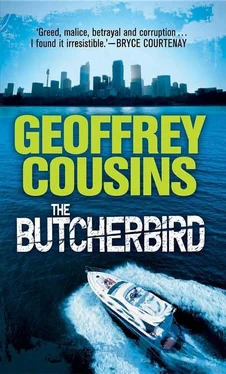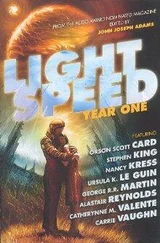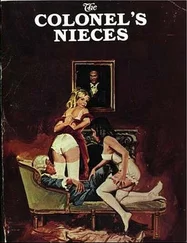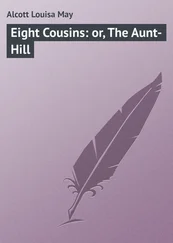Geoffrey Cousins - The Butcherbird
Здесь есть возможность читать онлайн «Geoffrey Cousins - The Butcherbird» весь текст электронной книги совершенно бесплатно (целиком полную версию без сокращений). В некоторых случаях можно слушать аудио, скачать через торрент в формате fb2 и присутствует краткое содержание. Жанр: Триллер, на английском языке. Описание произведения, (предисловие) а так же отзывы посетителей доступны на портале библиотеки ЛибКат.
- Название:The Butcherbird
- Автор:
- Жанр:
- Год:неизвестен
- ISBN:нет данных
- Рейтинг книги:5 / 5. Голосов: 1
-
Избранное:Добавить в избранное
- Отзывы:
-
Ваша оценка:
- 100
- 1
- 2
- 3
- 4
- 5
The Butcherbird: краткое содержание, описание и аннотация
Предлагаем к чтению аннотацию, описание, краткое содержание или предисловие (зависит от того, что написал сам автор книги «The Butcherbird»). Если вы не нашли необходимую информацию о книге — напишите в комментариях, мы постараемся отыскать её.
The Butcherbird — читать онлайн бесплатно полную книгу (весь текст) целиком
Ниже представлен текст книги, разбитый по страницам. Система сохранения места последней прочитанной страницы, позволяет с удобством читать онлайн бесплатно книгу «The Butcherbird», без необходимости каждый раз заново искать на чём Вы остановились. Поставьте закладку, и сможете в любой момент перейти на страницу, на которой закончили чтение.
Интервал:
Закладка:
The street was alive tonight. Executive cars were ferrying executive persons back to the safety of their leafy driveways and the welcome of their patient wives. Buses were disgorging schoolboys weighed down with backpacks full of football gear and Catcher in the Rye. Young women in tailored skirts and blazers were returning from law firms and accountants’ offices insisting to their mothers that they wouldn’t be waiting by panelled doors with peep holes for the return of the master. Dogs were leaping for joy at the gathering of the pack and the smell of lamb roasting in the oven. All was safe, placid, pleasant in the realm of suburbia.
Jack waited for an hour, watching. It reminded him of the life he’d grown up with and the relaxed easiness of it all came back to him in a drift of nostalgia. He remembered riding his bike down streets like this, arms in the air, just balancing with the sway of his body, not a care in the world. His cell phone rang and rang out. He switched it off. The street was quiet now. Dinner was being served. Homework books were being discovered under unwashed tracksuits next to half-eaten apples.
Television was siphoning off minds into unreality. The lights went on in the workshop.
Still he lingered. He was reluctant to go in. He placed both hands on the steering wheel, expecting them to be shaking with the irregular rhythm of his breathing, but they rested calmly on the yellowy leather. It was time.
He eased open the door then closed it gently behind him, as if it were important to be quiet. Clandestine meetings that everyone knew about still required respect for the conventions. He trod carefully on the soft covering of leaf litter. There was no wind to rustle the birches tonight, no moon to silver the trunks. A possum hissed and leapt in the branches above. He hesitated on the stone path when he could see the lighted window above the workbench, and listened to the whirring of the lathe. Sometimes it screamed and yowled as it tore at the wood, but tonight it was a steady, mechanical whirr. He knocked on the heavy, ribbed door.
There was no response. The lathe whirred, the birches stood guard. He rapped with a closed fist and the door rattled against the jamb. Nothing. Normally, all sounds would cease at his first knocking and then he would hear only the soft pad of slippers on the wide boards. He reached for the forged hasp, its manufacture previously described to him in loving detail, and the door swung open. He could see the dense bulk of the old lawyer hunched over the workbench, intent on the machine before him. He called out a greeting, but there was no response. And then he knew.
He was frozen. He couldn’t approach the workbench. He had to move, but his systems wouldn’t obey. He gulped great lungfuls of air. And then, in a rush, he was at the bench and his hands were on the shoulders and the body fell forward, face down on the rough wood.
He cried out as the lathe continued its scream, dangerously close to the gnarled face. Why was it still operating? The foot pedal. He sank to his knees and grasped the ankle in the thick wool sock and pushed, hard, but the foot wouldn’t shift off the ugly contraption. It was wedged somehow, the weight of the body twisted onto it. He tried to lift the leg, to free the man from the machine, to stop the appalling noise that was now screaming into his brain. If only he could stop the noise everything would be all right.
He knelt higher, sweating under the bench, frantic, panicked, grasping at the legs and the trunk to shift the weight. He lifted and pushed simultaneously and suddenly the foot was free and the scream was stifled. He fell back in relief and sat, panting like an exhausted hound.
And then, before he could prevent it, the body began to slide, crashing to the floor in a swirl of sawdust and shavings. Now it wasn’t a body anymore, but a man. The face was compressed into a grimace by the neck forcing it onto the floorboards, but it was the face he’d come to trust, to admire, maybe more.
He crawled to the man and held the face in his hands and wiped the shavings away. Should he be forcing the mouth open, breathing his breath into these lungs, pounding this old heart, running, ringing, someone, somewhere? But he knew he was holding only the body, not the life. He gently turned the face away from the floor and straightened the bent legs and flayed arms. The old lawyer was sleeping now, at peace in the detritus of his life’s work, ready for the rituals of the world he’d left behind.
Jack slumped into the chair by the stove. He was shaking, shivering, still gulping air to no purpose and then, without warning or knowledge, he began to howl.
The long, haunting wail rose into the beams and rang off the iron roof and seemed never to stop.
That was how she found him, in her husband’s chair, keening over his body. She’d lost a son, and part of a husband, long ago; she knew the living had more need of her. She knelt before the chair and wrapped his head in her and gradually the howling subsided into sobbing until finally his whole body relaxed into her, and it was over.
It was late, Louise would be worried. He’d rung no one. He felt he’d never switch on the phone again. They would retreat somewhere, the four of them, cocoon themselves in a safe haven. Run away, start anew. Tasmania, perhaps. Yes, Tasmania, Louise loved it there; the great forests, the wild rivers, the cleanest air on earth, the cleanest water. That was what they needed-to be washed clean of the grime of falsity and fakery.
It was finished now. There was only the old lawyer’s funeral to come. The rest of it was buried already. He could leave any time he liked. He owed no one anything. He’d tried; it was more than most people bothered with. It was good enough.
But then there was Louise. Would she let go now? She’d have to see there was no chance without the old lawyer, have to realise their hopes lay in the sawdust on that concrete floor. She didn’t have to know about his own failure. She could keep believing he was a hero defeated by circumstance. The truth wasn’t always a necessity.
The house was ablaze with light when he drove up Alice Street. She was standing in the doorway, waiting, and ran to meet him on the path. She enveloped him and almost carried him into the house, and he was sobbing again before they reached the door.
‘How did you know?’
‘She rang. His wife. She said you needed looking after. What a remarkable woman.’
Sarah and Shane were waiting inside and the four of them held one another, wrapped together in a knot of limbs, not speaking. Finally, exhausted, they all found bed, if not sleep. He wanted to talk now, to tell her everything, even the failure, even the frailty, even his guilt. He’d killed an old man with his arrogance. He’d been warned, asked to stop, begged for compassion. But no, he’d known what was right, what was wrong, what was black and what was white. Well what did he know now? The sour taste of bile in the mouth, the rank odour of defeat and death.
She was patient with him, but pragmatic. Overdramatisation was dismissed, though gently. She would have nothing of the guilt, nothing of the failure, but when he said he wanted to walk away, she didn’t oppose it.
‘We’ll see. You’ve all your other friends helping you. The Pope or whatever his name is, and the others in the group. Talk to them. Seek their advice. That document is still in the safe, don’t forget that. Yes, it’s a tragedy this man has died. I think you loved him in some way. But be sorry for him, and his wife, not for yourself. And maybe we can make his death worth something. And if it doesn’t all resolve itself, a stone cottage by a river in Tasmania with lupins in the paddocks and salmon in the oven sounds fine to me.’
When sleep came, it was the deep, still sleep of spent emotion from which waking is the only dream.
Читать дальшеИнтервал:
Закладка:
Похожие книги на «The Butcherbird»
Представляем Вашему вниманию похожие книги на «The Butcherbird» списком для выбора. Мы отобрали схожую по названию и смыслу литературу в надежде предоставить читателям больше вариантов отыскать новые, интересные, ещё непрочитанные произведения.
Обсуждение, отзывы о книге «The Butcherbird» и просто собственные мнения читателей. Оставьте ваши комментарии, напишите, что Вы думаете о произведении, его смысле или главных героях. Укажите что конкретно понравилось, а что нет, и почему Вы так считаете.












